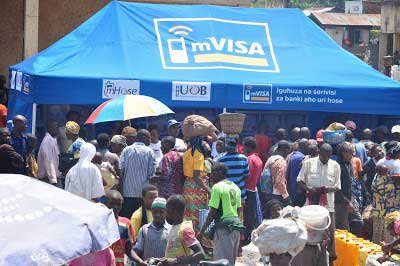This year will be remembered as one where most banks and telecom companies increased and improved electronic payments platforms, with a common target of reaching the financially excluded.Payment systems are important for monetary policy implementation and for the financial sector development.This requires an efficient and secure national payment system that ensures smooth and risk-free transactions.The government was not left out, improving the use of Rwanda Integrated Payments Processing System (RIPPS) which allows automatic gross settlements in real time.


This year will be remembered as one where most banks and telecom companies increased and improved electronic payments platforms, with a common target of reaching the financially excluded.Payment systems are important for monetary policy implementation and for the financial sector development.This requires an efficient and secure national payment system that ensures smooth and risk-free transactions.The government was not left out, improving the use of Rwanda Integrated Payments Processing System (RIPPS) which allows automatic gross settlements in real time. This is part its efforts to make the Second Economic Development and Poverty Reduction Strategy (EDPRS II) a success through proper accountability and good corporate governance.John Rwangombwa, the central bank governor, however, said in spite of all the improvements in the area, all the commercial banks, telecoms and other electronic payments stakeholders still needed to carry out mass sensitisation to encourage Rwandans to adapt the user friendly methods to promote a cashless economy."Most commercial banks have automated teller machines (ATMs) countrywide or points of sales and mobile banking, but many people don’t know how to use them. This calls for massive drives to encourage Rwandans to use these platforms,” he said during the release of the monetary policy and financial statement report for the fourth quarter of this year at the National Bank of Rwanda head office in Kigali last week.He added that works were in progress to increase the cards’ interoperability so that they could work on all points of sale devices.According to the monetary policy and financial stability statement for the third quarter released in August, between December last year and June this year, the number of ATMs increased by 10.7 per cent, from 292 to 323, while the number of points of sale devices increased by 19.7 per cent, from 666 in March to 797 in June. The number of debit cards went up by 13.25 per cent, from 389,269 to 440,875, and that of credit cards rose by 182.1 per cent from 418 to 1,179.However, the ATMs’ efficiency dropped from 94 per cent in March to 91 per cent in June, this year, due to the frequent hardware and network issues encountered during the first half of this year, the report added.Going mobile, mVisa, a product of Visa, was launched in April this year, with two banks, Bank of Kigali and Urwego Opportunity Bank linked to the network to facilitate funds movement between mobile payments and mobile banking wallets of clients. More financial institutions are coming on board.Sanjeev Anand, the I&M Bank Rwanda managing director, said the bank will launch its mVisa product next year."Our mVisa is going to be unique to suit customer needs. "We will also carry out mass sensitisation campaigns countrywide on the benefits of using the platform to ensure mass acceptability among our clients,” he said.Financial sector analysts, say mVisa could enable local banks stem competition from telecom firms’ mobile money services.The mobile money transfer service has been a thorn in the flesh of bankers as it is preferred by the ordinary people, especially in areas where there is no or limited presence of banks. The three local telecom operators, MTN, Tigo and Airtel have been able to push millions of dollars through the platform during the year.Airtel made it easier for both mobile money and banking users by striking a deal with RSwitch, the firm in charge of facilitating all electronic payments in the country in October to enable subscribers to carry out transactions at RSwitch operated bank ATMs across the country, according to Konde Bugingo, the RSwitch chief executive officer.In this case, the ATM machine acts as a mobile money agent with the option of using it in one’s Airtel money menu.Tigo, on the other hand, now allows Tigo Cash clients to send or receive money locally and to Tigo subscribers in Tanzania.All these and other innovations in mobile payment of taxes and Rwanda Social Security Board contributions show how increasingly popular mobile and electronic payment services trended over the year, especially among the rural population.However, as the MTN Rwanda chief executive officer, Ebenezer Asante noted last month, a lot of digital education needs to be carried out to promote the platforms among the public. He also called for proper safeguards to ensure that consumers’ cash is secure.Sector players predicted that mobile platforms would become more popular going into the New Year. "The Rwandan market presents massive potential for the players if they adopt more innovative approaches to deepen their reach among the populace,” they argued.


